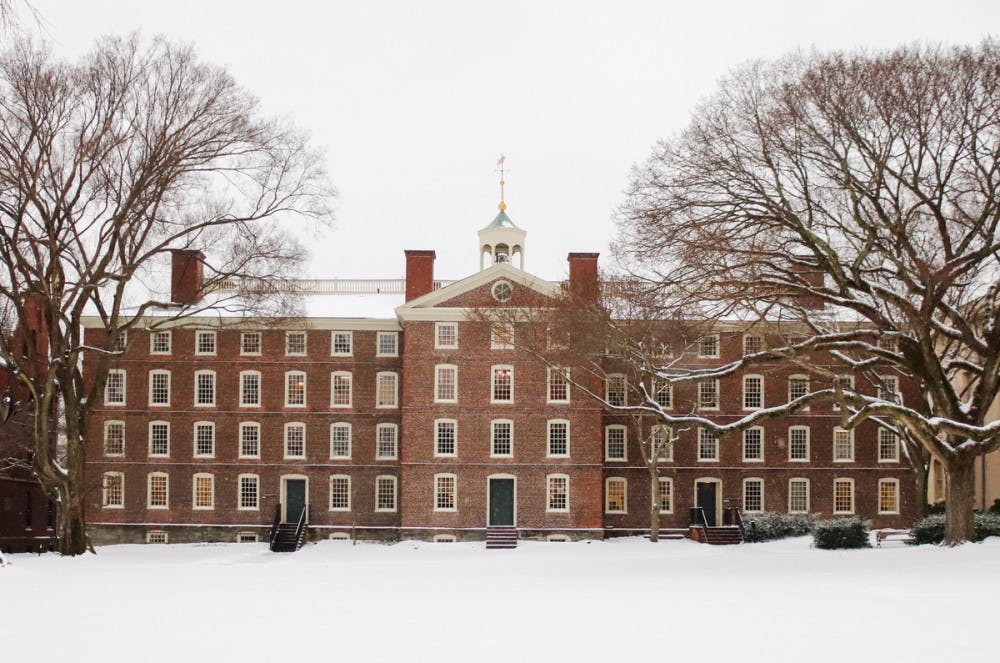The Corporation — the University’s highest governing body — reviewed initiatives and plans for the upcoming year, ranging from the creation of an art initiative to the formalization of an internal Equity, Diversity and Inclusion Committee, during its February meetings, according to a Feb. 8 letter from President Christina Paxson P ’19.
The Corporation also approved a 2.85 percent increase in tuition, the lowest annual tuition increase in more than a decade, The Herald previously reported.
Several years ago, the University set a goal to bring down the rate of tuition increases to “promote a long-term goal of making Brown a truly affordable education for everyone,” said Provost Richard Locke P ’18. In 2019, tuition increased by 5 percent, and in 2020, it increased by 3.75 percent.
“I don't know if it'll ever go to 0 percent, but we will try to keep the increases relatively modest as one of the many things that we're doing to enhance the affordability around education,” Locke said.
The additional $16 million from the increased tuition will go towards the University’s goals of increasing financial aid and providing faculty and staff with raises to match the rising costs of living expenses, Locke explained. Tuition and fees also fund the majority of the University’s annual operating budget.
The task of the creation of the University budget and tuition falls to the University Resources Committee, which is headed by Locke and has a membership consisting of both students and faculty. The Committee looks at University expenses and revenue and analyzes strategic priorities for the coming years, Locke said.
The committee also compares Brown’s tuition costs to those at other top universities. “We don't want to be the number one most expensive university, but we also don't want to be the least expensive university,” Locke said, noting that the least expensive universities usually have endowments much larger than Brown’s.
The decisions made by the URC were brought to Paxson and later the Corporation for final approval at the Feb. 5 meeting.
The Corporation also formally accepted approximately $168 million in donations made to the University since October and subsequently approved the creation of endowed positions.
Other University committees presented updates on their ongoing initiatives during the Corporation meeting. The Committee on Risk and Audit, which has overseen campus safety protocols in the face of the COVID-19 pandemic, discussed academic excellence at the University.
The Committee on Facilities and Planning reviewed updates on construction of University capital projects such as the Health and Wellness Dorm and plans for researching space utilization to “inform academic priorities and investments in this important area,” the letter said.
The Committee on Budget and Finance approved resuming the design process for the new undergraduate residence hall, which was announced in Feb. 2020 and had been paused due to the COVID-19 pandemic according to the letter. The committee also authorized a renovation project for the Meehan Auditorium that will upgrade the locker rooms and lounge.
Other Corporation committees “engaged in topics such as equity and integrity in admissions, strategic plans for advancing research, external reviews of academic departments and lessons learned this year from online and hybrid instruction,” the letter said.
The Corporation also heard from Dean of the School of Public Health Ashish Jha, who presented on his first few months as dean and discussed his plans for the future of the school.
The Corporation approved the creation of an internal standing Committee on Equity, Diversity and Inclusion in place of the ad hoc committee that has overseen the Diversity and Inclusion Action Plan for the past several years. Its responsibilities will include ensuring the University maintains “an equitable working and teaching environment” and increasing diversity and inclusion efforts, the letter said.
Locke, Professor of Literary Arts Thalia Field and Brown Arts Initiative Artistic Director Avery Willis Hoffman gave an update on the Brown Arts Initiative, which was created in 2016 as a way to host art events spanning University departments, Locke said.
To institutionalize the Arts Initiative, Locke charged a task force in the fall to create a proposal for an institute similar in structure to the Watson Institute for International and Public Affairs or the Cogut Institute for the Humanities.
Because of the University’s shared governance system, faculty members must first propose such new initiatives for approval. Locke hopes that the task force will have a proposal ready for approval by the May Corporation meeting. “It's basically institutionalizing a lot of collaboration that already happens and then planning for what more we can do,” Locke said.
Corporation trustees have also been “very attentive” to checking in on students during the COVID-19 pandemic, Locke said. Prior to the Corporation meeting, they had met with students on Feb. 4.
“They just want to make sure that (the students are) doing okay, that they're being taken care of,” Locke said. “This is a group of people who primarily are trying to make sure that we're doing the right thing by our students.”

ADVERTISEMENT




